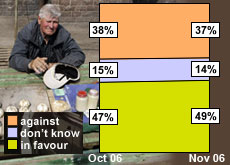
Funds for Europe hang in the balance

Supporters of a SFr1 billion ($800 million) contribution to the ten new European Union members have made a slight gain in an opinion poll before a nationwide vote.
But the gfs.bern polling institute that carried out the survey on behalf of the Swiss Broadcasting Corporation says the result of the referendum remains open.
“Two weeks before the vote, a decision is still not clear,” it commented.
On a second issue, there is still a clear majority in favour of unified minimum child benefits, ahead of the vote on November 26.
The institute reported on Wednesday that 49 per cent of voters now approve the contribution to EU countries outlined in the Eastern Europe Cooperation Act, two percentage points more than in the last poll in October.
It noted that the opponents’ share of the voted had gone down one percentage point from 38 per cent to 37 per cent. Those still undecided make up 14 per cent (-1 per cent) of those polled.
Mission not impossible
Various votes organised over the past few years on European issues have shown that opponents of closer ties with Europe have generally profited more at the end of a vote campaign than supporters. It is therefore not impossible for opponents to catch up.
The centre-left Social Democrats remain the most ardent of those supporting aid to the countries that joined the EU in 2004.
More than three-quarters (79 per cent) said they were in favour, up from 69 per cent in October.
In the opposite camp, 77 per cent of the rightwing Swiss People’s Party would vote “no”. In October, the figure was 69 per cent.
As for the other main political parties, they remain in favour of the new law but are not overwhelmingly enthusiastic.
Sympathisers of the centre-right Radical Party are 62 per cent behind the contribution, while the figure is 54 per cent within the centre-right Christian Democrats.
The new poll confirms that aid to eastern Europe is supported more by people with a good education and living in urban areas than those living in rural areas.
As for votes by language region – sometimes sensitive when it comes to relations with Europe – there are no significant differences of opinion.
Half of German speakers are in favour (+3 per cent) as are 46 per cent of French-speakers (-2 per cent) and 47 per cent of people who live in the Italian-language region.

More
Referendum
Large support
In the other national vote, the law on child benefits continues to have a large margin of support.
The survey showed that 70 per cent backed the plan (+1 per cent) while 19 per cent (-2 per cent) were against.
The institute commented that the law had achieved a “relatively broad consensus within society” whatever the criteria taken into consideration – age, political affinity, language region, sex or level of education.
The writing would therefore seem to be on the wall. Even if all the present undecided voters (11 per cent) voted “no”, rejection of the law would still be a bridge too far.
swissinfo, Olivier Pauchard

More
gfs.bern
Poll
Eastern Europe Cooperation Act: 49% in favour (+2%), 37% against (-1%) and 14% undecided (-1%).
Law on family allowances: 70% in favour (+1%), 19% against (-2%) and 11% undecided (+3%).
Voter participation expected: 46% (+3%).
This is the second survey carried out on the federal votes of November 26.
The gfs.bern institute surveyed 1,221 people from all Switzerland’s language regions by telephone from November 6-12.
The margin of error is plus or minus 2.8%.
The Eastern Europe Cooperation Act gives a new legal basis to Swiss aid to countries in the region after the fall of the Berlin Wall. It has a ten-year term.
The law will allow Switzerland to make a contribution of SFR1 billion to the ten countries that joined the EU on May 1, 2004. It is this measure in particular which prompted rightwing parties to call for a referendum on the issue.
The federal law on family allowances allows some kind of harmonisation of the current system. At present, the cantons apply different rules.
The law foresees a minimum monthly allowance of SFr200 for children and SFr250 for young people above 16 who are still in education. The Swiss Association of Small and Medium-Sized Enterprises in particular has opposed the law, arguing it will cost businesses too much.

In compliance with the JTI standards
More: SWI swissinfo.ch certified by the Journalism Trust Initiative






























You can find an overview of ongoing debates with our journalists here . Please join us!
If you want to start a conversation about a topic raised in this article or want to report factual errors, email us at english@swissinfo.ch.